The Cambridge History of China. Vol. 12: Republican China, 1912-1949, Part 1
Подождите немного. Документ загружается.

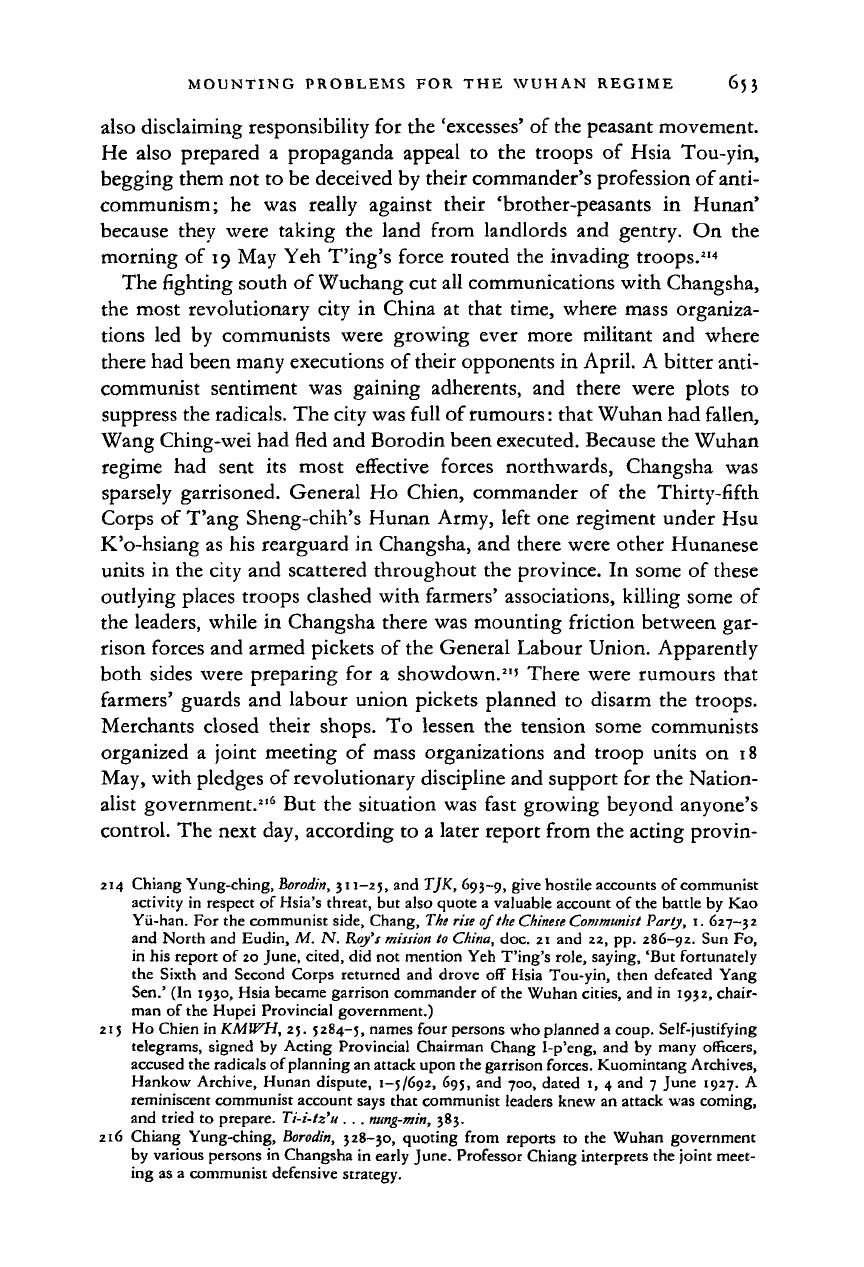
MOUNTING PROBLEMS FOR THE WUHAN REGIME 653
also disclaiming responsibility for the 'excesses' of the peasant movement.
He also prepared a propaganda appeal to the troops of Hsia Tou-yin,
begging them not to be deceived by their commander's profession of anti-
communism; he was really against their 'brother-peasants in Hunan'
because they were taking the land from landlords and gentry. On the
morning of 19 May Yeh T'ing's force routed the invading troops.
214
The fighting south of Wuchang cut all communications with Changsha,
the most revolutionary city in China at that time, where mass organiza-
tions led by communists were growing ever more militant and where
there had been many executions of their opponents in April. A bitter anti-
communist sentiment was gaining adherents, and there were plots to
suppress the radicals. The city was full of
rumours:
that Wuhan had fallen,
Wang Ching-wei had fled and Borodin been executed. Because the Wuhan
regime had sent its most effective forces northwards, Changsha was
sparsely garrisoned. General Ho Chien, commander of the Thirty-fifth
Corps of T'ang Sheng-chih's Hunan Army, left one regiment under Hsu
K'o-hsiang as his rearguard in Changsha, and there were other Hunanese
units in the city and scattered throughout the province. In some of these
outlying places troops clashed with farmers' associations, killing some of
the leaders, while in Changsha there was mounting friction between gar-
rison forces and armed pickets of the General Labour Union. Apparently
both sides were preparing for a showdown.
21
' There were rumours that
farmers' guards and labour union pickets planned to disarm the troops.
Merchants closed their shops. To lessen the tension some communists
organized a joint meeting of mass organizations and troop units on 18
May, with pledges of revolutionary discipline and support for the Nation-
alist government.
2
'
6
But the situation was fast growing beyond anyone's
control. The next day, according to a later report from the acting provin-
214 Chiang Yung-ching,
Borodin,
311-25, and TJK, 693-9, S'
ve
hostile accounts of communist
activity in respect of Hsia's threat, but also quote a valuable account of the battle by Kao
Yii-han. For the communist side, Chang, The
rise
of
the Chinese
Communist Party, 1. 627-32
and North and Eudin, M. N. Roy's
mission
to China, doc. 21 and 22, pp. 286-92. Sun Fo,
in his report of 20 June, cited, did not mention Yeh T'ing's role, saying, 'But fortunately
the Sixth and Second Corps returned and drove off Hsia Tou-yin, then defeated Yang
Sen.' (In 1930, Hsia became garrison commander of the Wuhan cities, and in 1932, chair-
man of the Hupei Provincial government.)
215 Ho Chien in
KMWH,
25. 5284-5, names four persons who planned a coup. Self-justifying
telegrams, signed by Acting Provincial Chairman Chang I-p'eng, and by many officers,
accused the radicals of planning an attack upon the garrison forces. Kuomintang Archives,
Hankow Archive, Hunan dispute,
1-5/692,
695, and 700, dated i, 4 and 7 June 1927. A
reminiscent communist account says that communist leaders knew an attack was coming,
and tried to prepare. Ti-i-tz'u . . .
nung-min,
383.
216 Chiang Yung-ching, Borodin, 328-30, quoting from reports to the Wuhan government
by various persons in Changsha in early June. Professor Chiang interprets the joint meet-
ing as a communist defensive strategy.
Cambridge Histories Online © Cambridge University Press, 2008
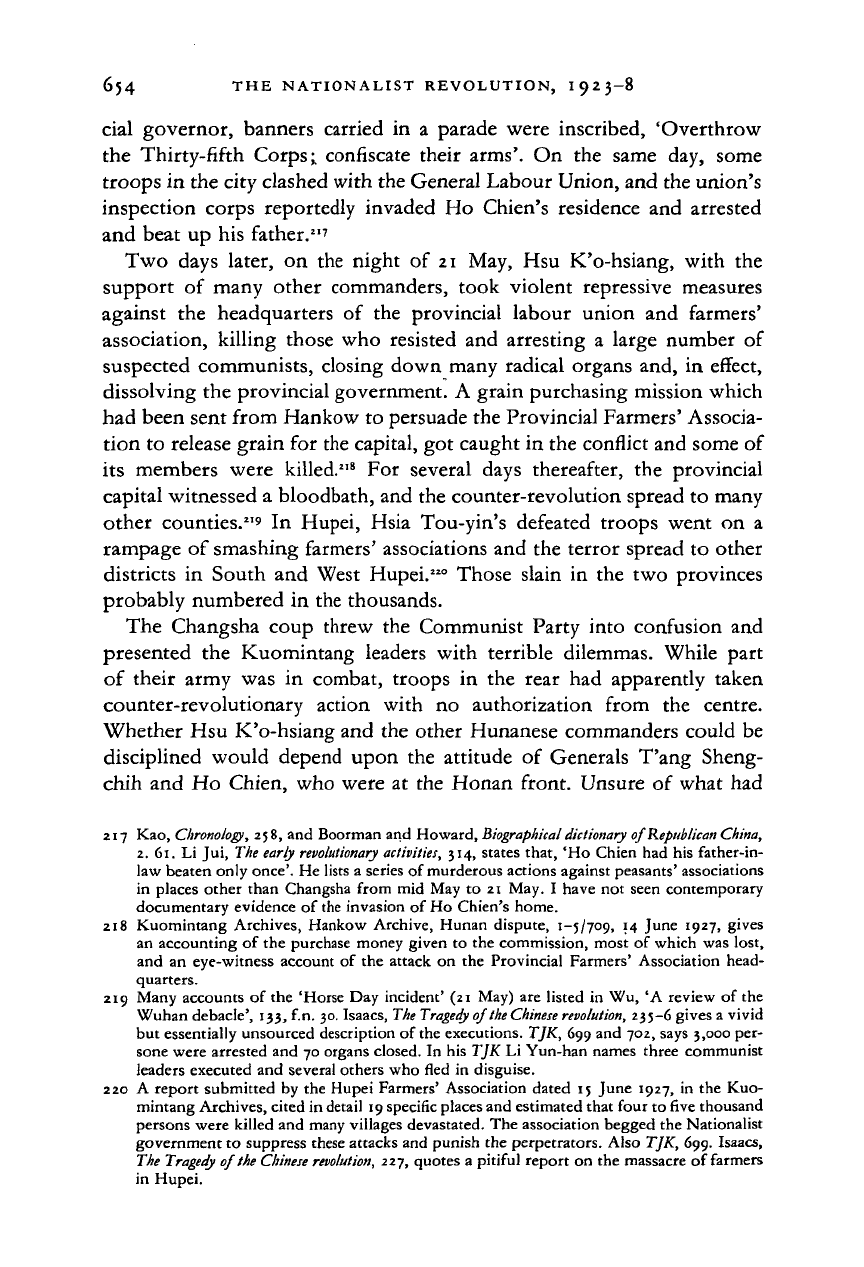
654 THE NATIONALIST REVOLUTION, 1923-8
cial governor, banners carried
in a
parade were inscribed, 'Overthrow
the Thirty-fifth Corps; confiscate their arms'.
On the
same
day,
some
troops
in
the city clashed with the General Labour Union, and the union's
inspection corps reportedly invaded
Ho
Chien's residence
and
arrested
and beat
up his
father.
217
Two days later,
on the
night
of
21
May, Hsu
K'o-hsiang, with
the
support
of
many other commanders, took violent repressive measures
against
the
headquarters
of the
provincial labour union
and
farmers'
association, killing those
who
resisted
and
arresting
a
large number
of
suspected communists, closing down many radical organs and,
in
effect,
dissolving
the
provincial government.
A
grain purchasing mission which
had been sent from Hankow
to
persuade the Provincial Farmers' Associa-
tion
to
release grain
for
the capital,
got
caught
in
the conflict and some
of
its members were killed.
218
For
several days thereafter,
the
provincial
capital witnessed
a
bloodbath, and the counter-revolution spread
to
many
other counties.
21
'
In
Hupei, Hsia Tou-yin's defeated troops went
on a
rampage
of
smashing farmers' associations
and
the terror spread
to
other
districts
in
South
and
West Hupei.
220
Those slain
in the two
provinces
probably numbered
in
the thousands.
The Changsha coup threw
the
Communist Party into confusion
and
presented
the
Kuomintang leaders with terrible dilemmas. While part
of their army
was in
combat, troops
in the
rear
had
apparently taken
counter-revolutionary action with
no
authorization from
the
centre.
Whether
Hsu
K'o-hsiang and
the
other Hunanese commanders could
be
disciplined would depend upon
the
attitude
of
Generals T'ang Sheng-
chih
and Ho
Chien, who were
at the
Honan front. Unsure
of
what
had
217 Kao,
Chronology,
258,
and
Boorman
and
Howard,
Biographical dictionary
of
Republican
China,
2.
61.
Li
Jui,
The early revolutionary
activities,
314, states that,
'Ho
Chien had his father-in-
law beaten only once'. He lists
a
series
of
murderous actions against peasants' associations
in places other than Changsha from
mid
May
to
21 May.
I
have
not
seen contemporary
documentary evidence
of
the invasion
of
Ho Chien's home.
218 Kuomintang Archives, Hankow Archive, Hunan dispute,
1-5/709,
14
June 1927, gives
an accounting
of
the purchase money given
to
the commission, most
of
which was lost,
and
an
eye-witness account
of
the attack
on the
Provincial Farmers' Association head-
quarters.
219 Many accounts
of
the 'Horse Day incident' (21 May)
are
listed
in
Wu,
'A
review
of
the
Wuhan debacle',
133,
f.n.
30.
Isaacs,
The Tragedy
of
the Chinese
revolution,
235-6 gives a vivid
but essentially unsourced description
of
the executions. TJK, 699 and 702, says 3,000 per-
sone were arrested and 70 organs closed.
In
his TJK Li Yun-han names three communist
leaders executed
and
several others who fled
in
disguise.
220
A
report submitted
by the
Hupei Farmers' Association dated 15 June 1927,
in the
Kuo-
mintang Archives, cited in detail
19
specific places and estimated that four to five thousand
persons were killed and many villages devastated. The association begged the Nationalist
government to suppress these attacks and punish the perpetrators. Also TJK, 699. Isaacs,
The Tragedy
of
the Chinese
revolution,
227, quotes
a
pitiful report
on
the massacre
of
farmers
in Hupei.
Cambridge Histories Online © Cambridge University Press, 2008
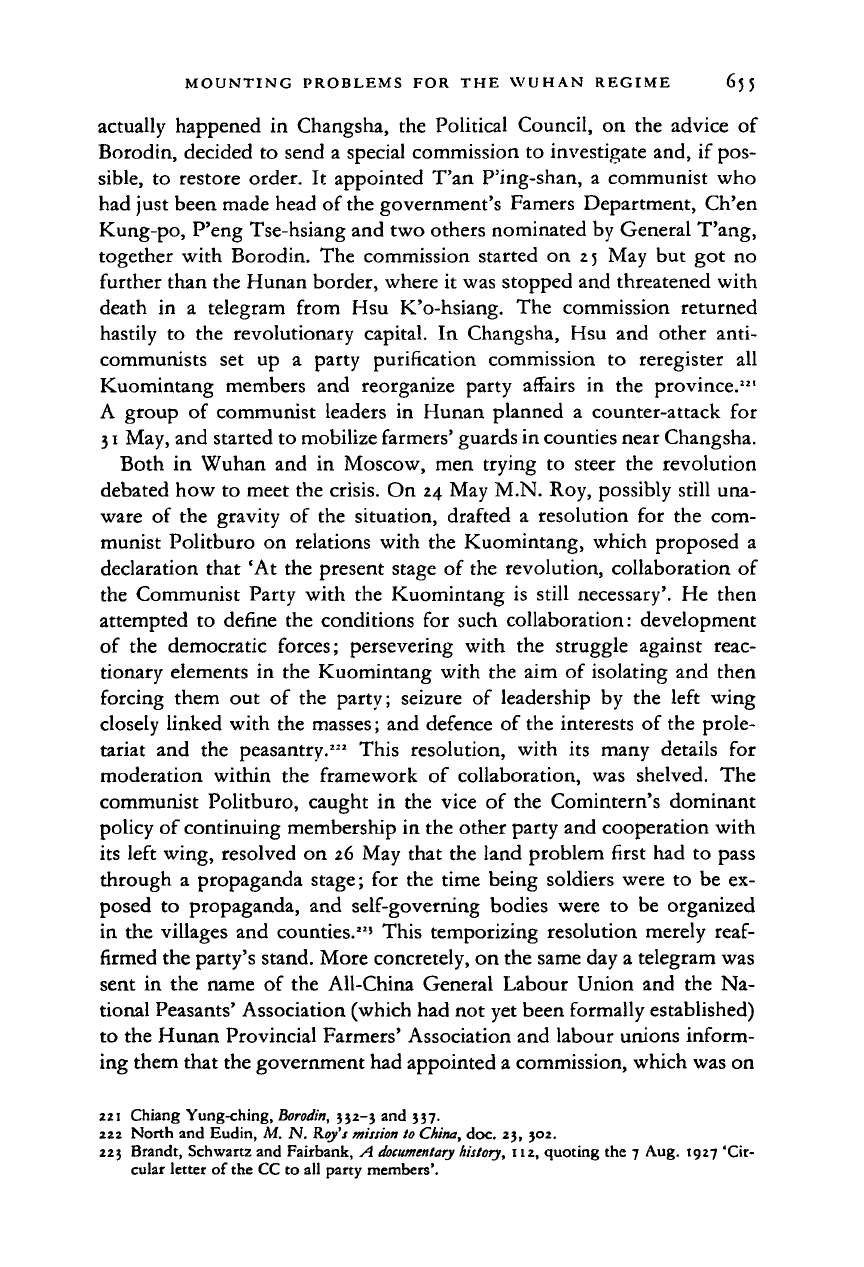
MOUNTING PROBLEMS FOR THE WUHAN REGIME 655
actually happened in Changsha, the Political Council, on the advice of
Borodin, decided to send a special commission to investigate and, if pos-
sible,
to restore order. It appointed T'an P'ing-shan, a communist who
had just been made head of the government's Famers Department, Ch'en
Kung-po, P'eng Tse-hsiang and two others nominated by General T'ang,
together with Borodin. The commission started on 25 May but got no
further than the Hunan border, where it was stopped and threatened with
death in a telegram from Hsu K'o-hsiang. The commission returned
hastily to the revolutionary capital. In Changsha, Hsu and other anti-
communists set up a party purification commission to reregister all
Kuomintang members and reorganize party affairs in the province.
221
A group of communist leaders in Hunan planned a counter-attack for
31 May, and started to mobilize farmers' guards in counties near Changsha.
Both in Wuhan and in Moscow, men trying to steer the revolution
debated how to meet the crisis. On 24 May M.N. Roy, possibly still una-
ware of the gravity of the situation, drafted a resolution for the com-
munist Politburo on relations with the Kuomintang, which proposed a
declaration that 'At the present stage of the revolution, collaboration of
the Communist Party with the Kuomintang is still necessary'. He then
attempted to define the conditions for such collaboration: development
of the democratic forces; persevering with the struggle against reac-
tionary elements in the Kuomintang with the aim of isolating and then
forcing them out of the party; seizure of leadership by the left wing
closely linked with the masses; and defence of the interests of the prole-
tariat and the peasantry."
2
This resolution, with its many details for
moderation within the framework of collaboration, was shelved. The
communist Politburo, caught in the vice of the Comintern's dominant
policy of continuing membership in the other party and cooperation with
its left wing, resolved on 26 May that the land problem first had to pass
through a propaganda stage; for the time being soldiers were to be ex-
posed to propaganda, and self-governing bodies were to be organized
in the villages and counties.
22
' This temporizing resolution merely
reaf-
firmed the party's stand. More concretely, on the same day a telegram was
sent in the name of the All-China General Labour Union and the Na-
tional Peasants' Association (which had not yet been formally established)
to the Hunan Provincial Farmers' Association and labour unions inform-
ing them that the government had appointed a commission, which was on
221 Chiang Yung-ching,
Borodin,
332-3 and 337.
222 North and Eudin, M. N. Koy's
mission
to
China,
doc. 23, 302.
22} Brandt, Schwartz and Fairbank, A
documentary
history,
112, quoting the 7 Aug. 1927 'Cir-
cular letter of the CC to all party members'.
Cambridge Histories Online © Cambridge University Press, 2008
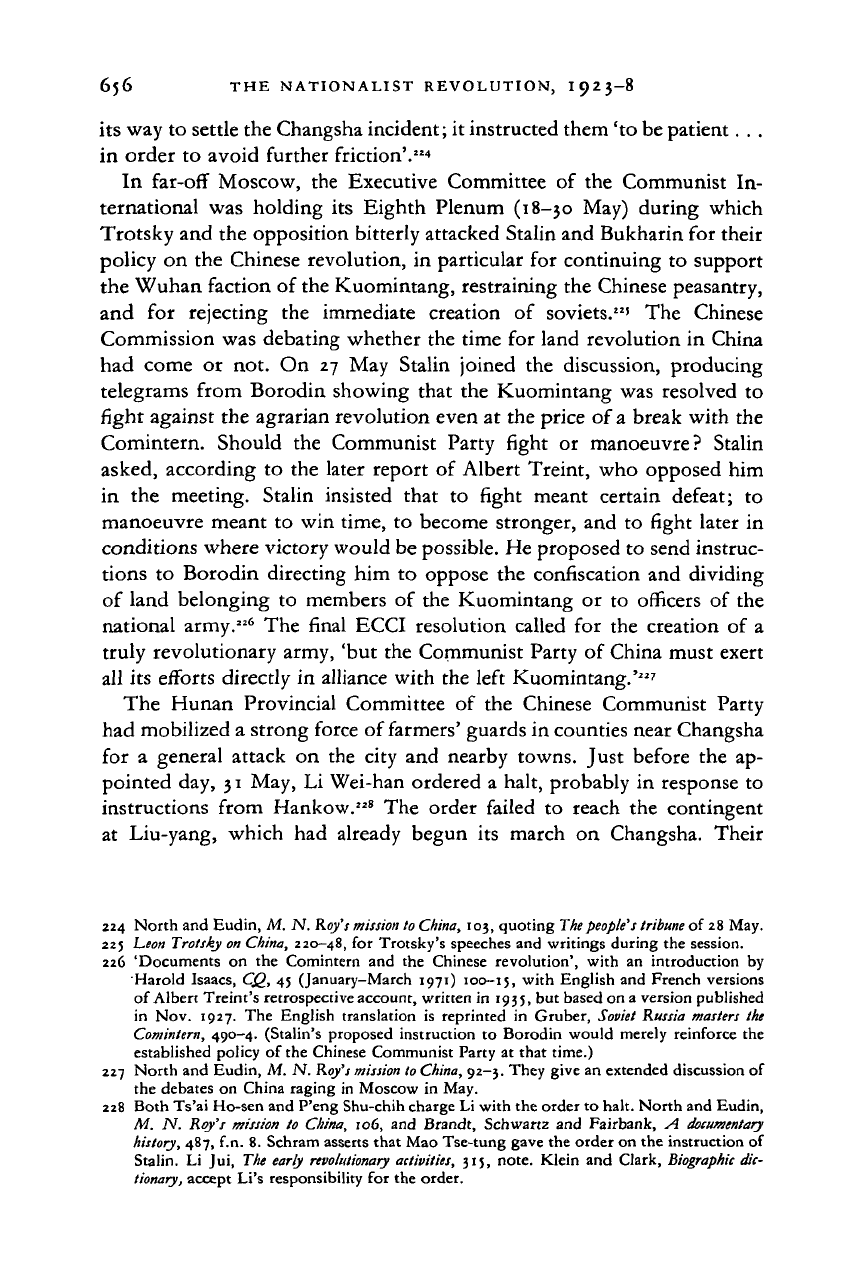
656 THE NATIONALIST REVOLUTION, I 9
2
3-8
its way
to
settle the Changsha incident;
it
instructed them
'to
be patient.
. .
in order
to
avoid further friction'."
4
In far-off Moscow,
the
Executive Committee
of the
Communist
In-
ternational
was
holding
its
Eighth Plenum (18-30
May)
during which
Trotsky and
the
opposition bitterly attacked Stalin and Bukharin
for
their
policy
on the
Chinese revolution,
in
particular
for
continuing
to
support
the Wuhan faction
of
the Kuomintang, restraining
the
Chinese peasantry,
and
for
rejecting
the
immediate creation
of
Soviets."'
The
Chinese
Commission
was
debating whether
the
time
for
land revolution
in
China
had come
or not. On 27 May
Stalin joined
the
discussion, producing
telegrams from Borodin showing that
the
Kuomintang
was
resolved
to
fight against
the
agrarian revolution even
at
the price
of
a break with
the
Comintern. Should
the
Communist Party fight
or
manoeuvre? Stalin
asked, according
to the
later report
of
Albert Treint,
who
opposed
him
in
the
meeting. Stalin insisted that
to
fight meant certain defeat;
to
manoeuvre meant
to win
time,
to
become stronger,
and to
fight later
in
conditions where victory would be possible. He proposed
to
send instruc-
tions
to
Borodin directing
him to
oppose
the
confiscation
and
dividing
of land belonging
to
members
of the
Kuomintang
or to
officers
of the
national army."
6
The
final ECCI resolution called
for the
creation
of a
truly revolutionary army,
'but the
Communist Party
of
China must exert
all
its
efforts directly
in
alliance with
the
left Kuomintang.'
227
The Hunan Provincial Committee
of the
Chinese Communist Party
had mobilized
a
strong force
of
farmers' guards
in
counties near Changsha
for
a
general attack
on the
city
and
nearby towns. Just before
the ap-
pointed day, 31 May,
Li
Wei-han ordered
a
halt, probably
in
response
to
instructions from Hankow.
228
The
order failed
to
reach
the
contingent
at Liu-yang, which
had
already begun
its
march
on
Changsha. Their
224 North
and
Eudin,
M. N.
Roy's
mission
to China, 103, quoting
The people's tribune
of
28
May.
225 Leon Trotsky on China, 220-48,
for
Trotsky's speeches
and
writings during
the
session.
226 'Documents
on the
Comintern
and the
Chinese revolution', with
an
introduction
by
Harold Isaacs,
CQ, 45
(January-March
1971)
100-15, with English
and
French versions
of Albert Treint's retrospective account, written
in
1935,
but
based
on a
version published
in
Nov. 1927. The
English translation
is
reprinted
in
Gruber, Soviet Russia masters
the
Comintern, 490-4. (Stalin's proposed instruction
to
Borodin would merely reinforce
the
established policy
of
the Chinese Communist Party
at
that time.)
227 North
and
Eudin,
M. N.
Roy's
mission
to China, 92-3. They give
an
extended discussion
of
the debates
on
China raging
in
Moscow
in May.
228 Both Ts'ai Ho-sen
and
P'eng Shu-chih charge
Li
with
the
order
to
halt. North
and
Eudin,
M. N.
Roy's mission
to
China,
106, and
Brandt, Schwartz
and
Fairbank,
A
documentary
history, 487,
f.n. 8.
Schram asserts that Mao Tse-tung gave
the
order
on the
instruction
of
Stalin.
Li Jui, The
early
revolutionary
activities,
315,
note. Klein
and
Clark,
Biographic
dic-
tionary,
accept
Li's
responsibility
for
the order.
Cambridge Histories Online © Cambridge University Press, 2008
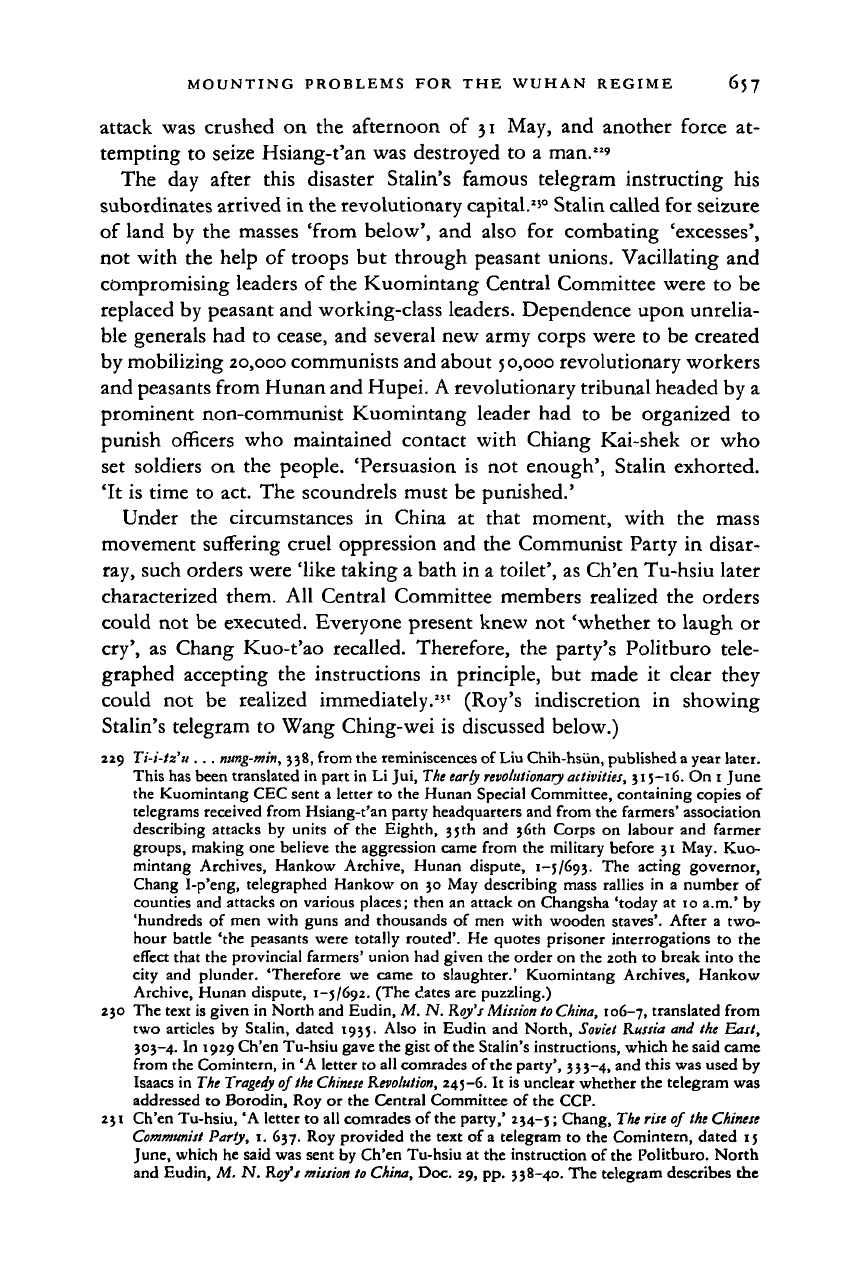
MOUNTING PROBLEMS
FOR THE
WUHAN REGIME
657
attack
was
crushed
on the
afternoon
of 31 May, and
another force
at-
tempting
to
seize Hsiang-t'an
was
destroyed
to a
man."
9
The
day
after this disaster Stalin's famous telegram instructing
his
subordinates arrived
in
the revolutionary capital.
2
'
0
Stalin called
for
seizure
of land
by the
masses 'from below',
and
also
for
combating 'excesses',
not with
the
help
of
troops
but
through peasant unions. Vacillating
and
compromising leaders
of
the Kuomintang Central Committee were
to be
replaced
by
peasant
and
working-class leaders. Dependence upon unrelia-
ble generals
had to
cease,
and
several
new
army corps were
to be
created
by mobilizing 20,000 communists
and
about 50,000 revolutionary workers
and peasants from Hunan
and
Hupei. A revolutionary tribunal headed
by a
prominent non-communist Kuomintang leader
had to be
organized
to
punish officers
who
maintained contact with Chiang Kai-shek
or who
set soldiers
on the
people. 'Persuasion
is not
enough', Stalin exhorted.
'It
is
time
to act. The
scoundrels must
be
punished.'
Under
the
circumstances
in
China
at
that moment, with
the
mass
movement suffering cruel oppression
and the
Communist Party
in
disar-
ray, such orders were 'like taking
a
bath
in a
toilet',
as
Ch'en Tu-hsiu later
characterized them.
All
Central Committee members realized
the
orders
could
not be
executed. Everyone present knew
not
'whether
to
laugh
or
cry',
as
Chang Kuo-t'ao recalled. Therefore,
the
party's Politburo tele-
graphed accepting
the
instructions
in
principle,
but
made
it
clear they
could
not be
realized immediately.
2
'
1
(Roy's indiscretion
in
showing
Stalin's telegram
to
Wang Ching-wei
is
discussed below.)
229 Ti-i-tz'u . . .
nung-min,
338, from the reminiscences of Liu Chih-hsiin, published a year later.
This has been translated in part in Li Jui,
The
early revolutionary
activities,
315-16. On
1
June
the Kuomintang CEC sent a letter to the Hunan Special Committee, containing copies of
telegrams received from Hsiang-t'an party headquarters and from the farmers' association
describing attacks by units of the Eighth, 35th and 36th Corps on labour and farmer
groups, making one believe the aggression came from the military before 31 May. Kuo-
mintang Archives, Hankow Archive, Hunan dispute, 1-5/693. The acting governor,
Chang I-p'eng, telegraphed Hankow on 30 May describing mass rallies in a number of
counties and attacks on various places; then an attack on Changsha 'today at 10 a.m.' by
'hundreds of men with guns and thousands of men with wooden staves'. After a two-
hour battle 'the peasants were totally routed'. He quotes prisoner interrogations to the
effect that the provincial farmers' union had given the order on the 20th to break into the
city and plunder. 'Therefore we came to slaughter.' Kuomintang Archives, Hankow
Archive, Hunan dispute,
1-5/692.
(The dates are puzzling.)
230 The text is given in North and Eudin, M. N. Roy's
Mission
to
China,
106-7, translated from
two articles by Stalin, dated 1935. Also in Eudin and North, Soviet Russia and the East,
303-4.
In 1929 Ch'en Tu-hsiu gave the gist of the Stalin's instructions, which he said came
from the Comintern, in 'A letter to all comrades of the party', 333-4, and this was used by
Isaacs in The
Tragedy
of
the
Chinese
Revolution,
245-6. It is unclear whether the telegram was
addressed to Borodin, Roy or the Central Committee of the CCP.
231 Ch'en Tu-hsiu, 'A letter to all comrades of the party,' 234-5; Chang,
The
rise
of
the
Chinese
Communist
Party, 1. 637. Roy provided the text of a telegram to the Comintern, dated 15
June,
which he said was sent by Ch'en Tu-hsiu at the instruction of the Politburo. North
and Eudin, M. N. Roy's
mission
to
China,
Doc. 29, pp. 338-40. The telegram describes the
Cambridge Histories Online © Cambridge University Press, 2008
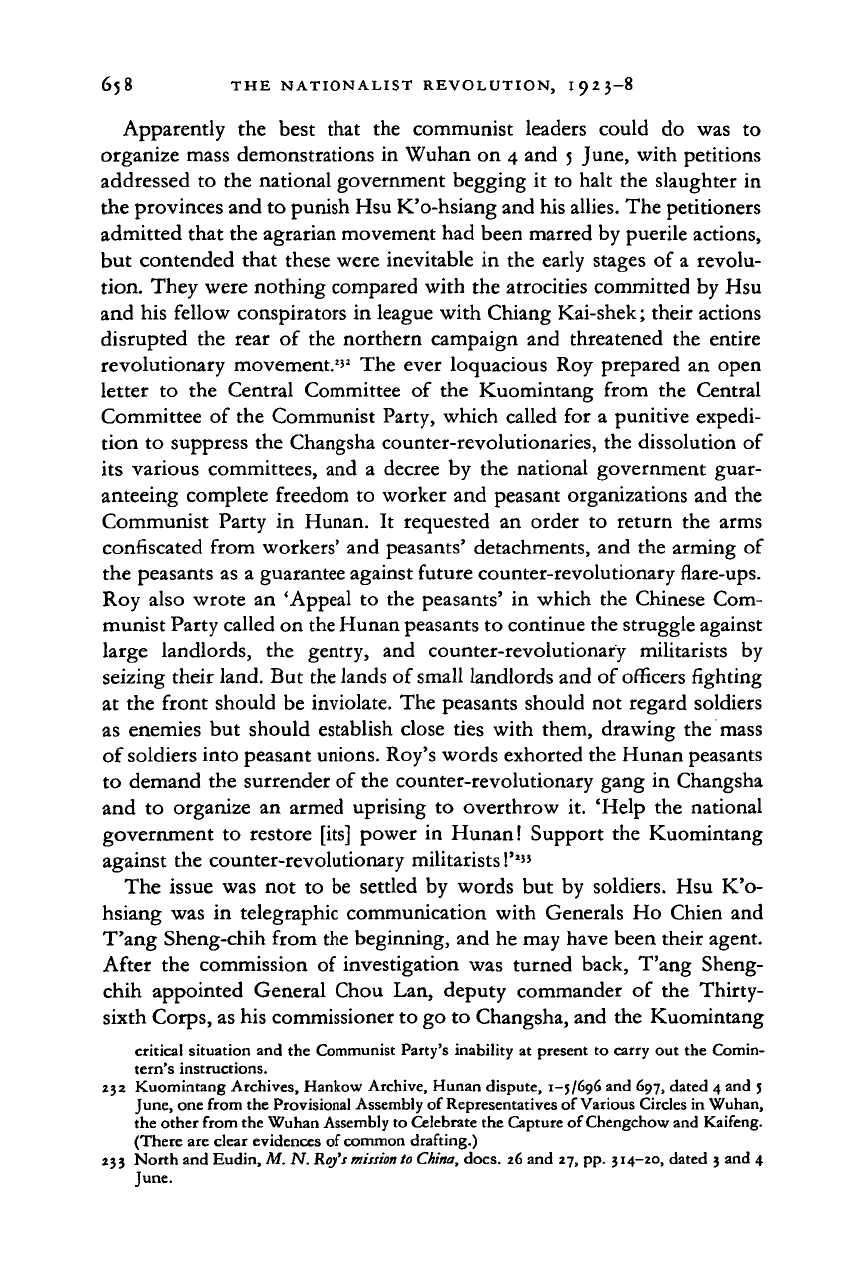
658 THE NATIONALIST REVOLUTION, 1925-8
Apparently the best that the communist leaders could do was to
organize mass demonstrations in Wuhan on 4 and 5 June, with petitions
addressed to the national government begging it to halt the slaughter in
the provinces and to punish Hsu K'o-hsiang and his allies. The petitioners
admitted that the agrarian movement had been marred by puerile actions,
but contended that these were inevitable in the early stages of a revolu-
tion. They were nothing compared with the atrocities committed by Hsu
and his fellow conspirators in league with Chiang Kai-shek; their actions
disrupted the rear of the northern campaign and threatened the entire
revolutionary movement.
2
'
2
The ever loquacious Roy prepared an open
letter to the Central Committee of the Kuomintang from the Central
Committee of the Communist Party, which called for a punitive expedi-
tion to suppress the Changsha counter-revolutionaries, the dissolution of
its various committees, and a decree by the national government guar-
anteeing complete freedom to worker and peasant organizations and the
Communist Party in Hunan. It requested an order to return the arms
confiscated from workers' and peasants' detachments, and the arming of
the peasants as a guarantee against future counter-revolutionary flare-ups.
Roy also wrote an 'Appeal to the peasants' in which the Chinese Com-
munist Party called on the Hunan peasants to continue the struggle against
large landlords, the gentry, and counter-revolutionary militarists by
seizing their land. But the lands of small landlords and of officers fighting
at the front should be inviolate. The peasants should not regard soldiers
as enemies but should establish close ties with them, drawing the mass
of soldiers into peasant unions. Roy's words exhorted the Hunan peasants
to demand the surrender of the counter-revolutionary gang in Changsha
and to organize an armed uprising to overthrow it. 'Help the national
government to restore [its] power in Hunan! Support the Kuomintang
against the counter-revolutionary militarists!'
255
The issue was not to be settled by words but by soldiers. Hsu K'o-
hsiang was in telegraphic communication with Generals Ho Chien and
T'ang Sheng-chih from the beginning, and he may have been their agent.
After the commission of investigation was turned back, T'ang Sheng-
chih appointed General Chou Lan, deputy commander of the Thirty-
sixth Corps, as his commissioner to go to Changsha, and the Kuomintang
critical situation and the Communist Party's inability at present to carry out the Comin-
tern's instructions.
Z32 Kuomintang Archives, Hankow Archive, Hunan dispute,
1-5/696
and 697, dated 4 and 5
June, one from the Provisional Assembly of Representatives of Various Circles in Wuhan,
the other from the Wuhan Assembly to Celebrate the Capture of Chengchow and Kaifeng.
(There are dear evidences of common drafting.)
233 North and Eudin, M. N.
Roy's mission
to
China,
docs. 26 and 27, pp. 314-20, dated 3 and 4
June.
Cambridge Histories Online © Cambridge University Press, 2008
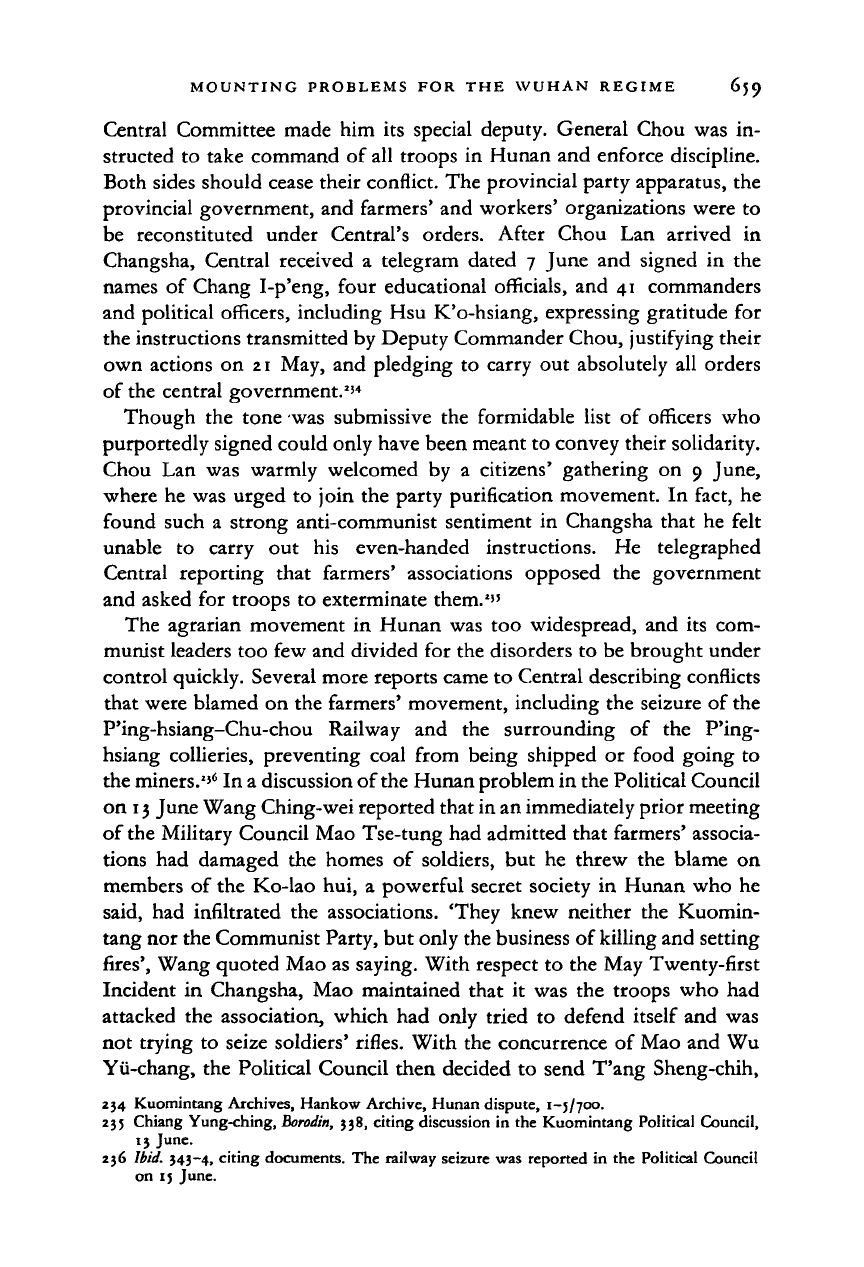
MOUNTING PROBLEMS FOR THE WUHAN REGIME 659
Central Committee made him its special deputy. General Chou was in-
structed to take command of all troops in Hunan and enforce discipline.
Both sides should cease their conflict. The provincial party apparatus, the
provincial government, and farmers' and workers' organizations were to
be reconstituted under Central's orders. After Chou Lan arrived in
Changsha, Central received a telegram dated 7 June and signed in the
names of Chang I-p'eng, four educational officials, and 41 commanders
and political officers, including Hsu K'o-hsiang, expressing gratitude for
the instructions transmitted by Deputy Commander Chou, justifying their
own actions on 21 May, and pledging to carry out absolutely all orders
of the central government.
2
'
4
Though the tone was submissive the formidable list of officers who
purportedly signed could only have been meant to convey their solidarity.
Chou Lan was warmly welcomed by a citizens' gathering on 9 June,
where he was urged to join the party purification movement. In fact, he
found such a strong anti-communist sentiment in Changsha that he felt
unable to carry out his even-handed instructions. He telegraphed
Central reporting that farmers' associations opposed the government
and asked for troops to exterminate them.
2
'
1
The agrarian movement in Hunan was too widespread, and its com-
munist leaders too few and divided for the disorders to be brought under
control quickly. Several more reports came to Central describing conflicts
that were blamed on the farmers' movement, including the seizure of the
P'ing-hsiang-Chu-chou Railway and the surrounding of the P'ing-
hsiang collieries, preventing coal from being shipped or food going to
the miners.
2
'
6
In a discussion of the Hunan problem in the Political Council
on
13
June Wang Ching-wei reported that in an immediately prior meeting
of the Military Council Mao Tse-tung had admitted that farmers' associa-
tions had damaged the homes of soldiers, but he threw the blame on
members of the Ko-lao hui, a powerful secret society in Hunan who he
said, had infiltrated the associations. 'They knew neither the Kuomin-
tang nor the Communist Party, but only the business of killing and setting
fires', Wang quoted Mao as saying. With respect to the May Twenty-first
Incident in Changsha, Mao maintained that it was the troops who had
attacked the association, which had only tried to defend itself and was
not trying to seize soldiers' rifles. With the concurrence of Mao and Wu
Yu-chang, the Political Council then decided to send T'ang Sheng-chih,
234 Kuomintang Archives, Hankow Archive, Hunan dispute, 1-5/700.
235 Chiang Yung-ching,
Borodin,
338, citing discussion in the Kuomintang Political Council,
13 June.
236
Ibid.
343-4, citing documents. The railway seizure was reported in the Political Council
on 15 June.
Cambridge Histories Online © Cambridge University Press, 2008
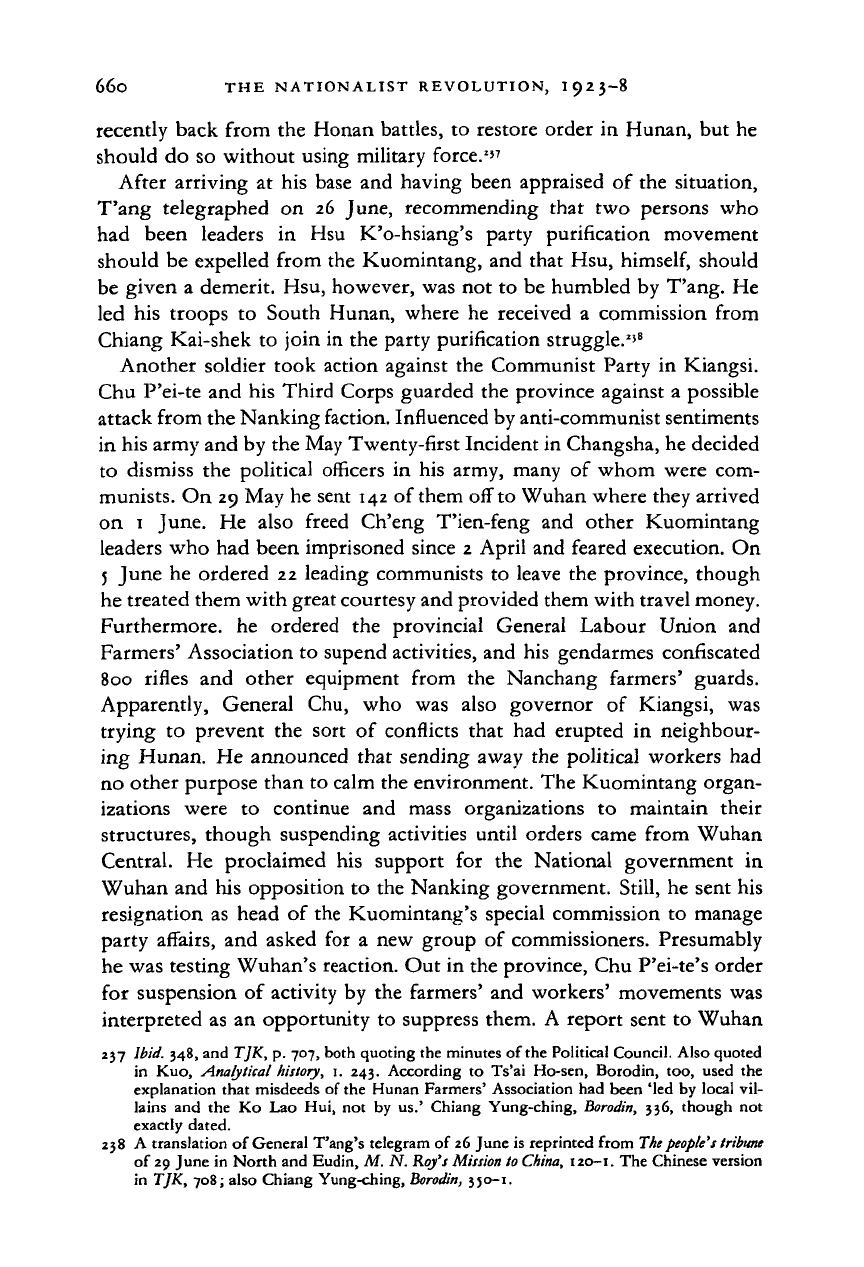
660 THE NATIONALIST REVOLUTION, I923-8
recently back from
the
Honan battles,
to
restore order
in
Hunan,
but he
should
do so
without using military force.
2
'
7
After arriving
at
his
base
and
having been appraised
of
the
situation,
T'ang telegraphed
on
26
June, recommending that
two
persons
who
had been leaders
in Hsu
K'o-hsiang's party purification movement
should
be
expelled from
the
Kuomintang,
and
that
Hsu,
himself,
should
be given
a
demerit.
Hsu,
however,
was not to be
humbled
by
T'ang.
He
led
his
troops
to
South Hunan, where
he
received
a
commission from
Chiang Kai-shek
to
join
in the
party purification struggle.
2
'
8
Another soldier took action against
the
Communist Party
in
Kiangsi.
Chu P'ei-te
and his
Third Corps guarded
the
province against
a
possible
attack from
the
Nanking faction. Influenced by anti-communist sentiments
in his army
and by the
May Twenty-first Incident
in
Changsha,
he
decided
to dismiss
the
political officers
in
his
army, many
of
whom were
com-
munists.
On 29 May he
sent 142
of
them
off
to Wuhan where they arrived
on
1
June.
He
also freed Ch'eng T'ien-feng
and
other Kuomintang
leaders
who had
been imprisoned since
2
April
and
feared execution.
On
5 June
he
ordered
22
leading communists
to
leave
the
province, though
he treated them with great courtesy and provided them with travel money.
Furthermore,
he
ordered
the
provincial General Labour Union
and
Farmers' Association
to
supend activities,
and his
gendarmes confiscated
800 rifles
and
other equipment from
the
Nanchang farmers' guards.
Apparently, General
Chu, who
was
also governor
of
Kiangsi,
was
trying
to
prevent
the
sort
of
conflicts that
had
erupted
in
neighbour-
ing Hunan.
He
announced that sending away
the
political workers
had
no other purpose than
to
calm
the
environment.
The
Kuomintang organ-
izations were
to
continue
and
mass organizations
to
maintain their
structures, though suspending activities until orders came from Wuhan
Central.
He
proclaimed
his
support
for the
National government
in
Wuhan
and his
opposition
to the
Nanking government. Still,
he
sent
his
resignation
as
head
of the
Kuomintang's special commission
to
manage
party affairs,
and
asked
for
a
new
group
of
commissioners. Presumably
he
was
testing Wuhan's reaction.
Out in the
province,
Chu
P'ei-te's order
for suspension
of
activity
by the
farmers'
and
workers' movements
was
interpreted
as an
opportunity
to
suppress them.
A
report sent
to
Wuhan
237
Ibid.
348, and TJK, p. 707, both quoting the minutes of the Political Council. Also quoted
in Kuo, Analytical
history,
1.
243. According
to
Ts'ai Ho-sen, Borodin, too, used
the
explanation that misdeeds of the Hunan Farmers' Association had been 'led by local vil-
lains
and the Ko Lao
Hui,
not by
us.' Chiang Yung-ching,
Borodin,
336, though
not
exactly dated.
238
A
translation
of
General T'ang's telegram
of
26 June is reprinted from
The people't tribune
of 29 June
in
North and Eudin, M.
N.
Roy's
Mission
to
China,
120-1.
The Chinese version
in TJK, 708; also Chiang Yung-ching,
Borodin,
350-1.
Cambridge Histories Online © Cambridge University Press, 2008
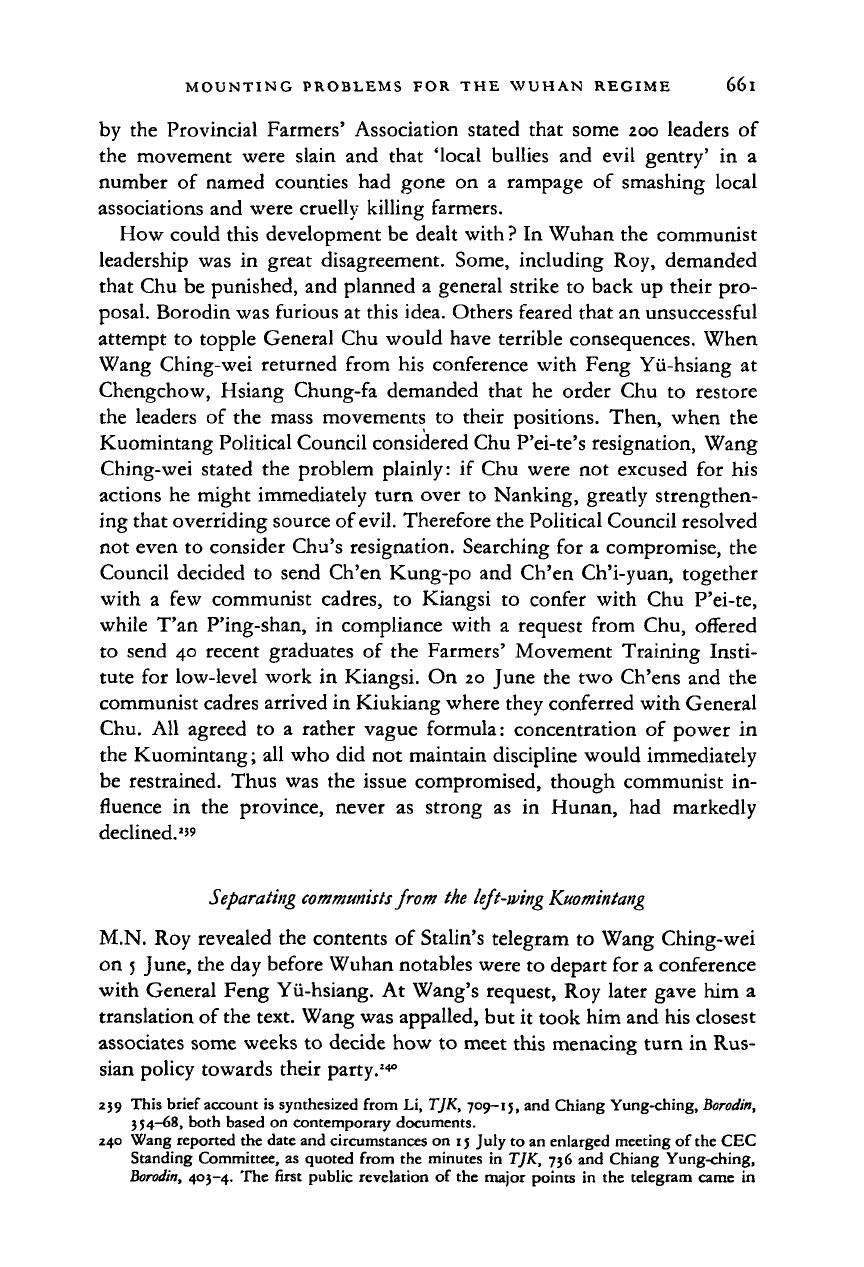
MOUNTING PROBLEMS FOR THE WUHAN REGIME 661
by the Provincial Farmers' Association stated that some 200 leaders of
the movement were slain and that 'local bullies and evil gentry' in a
number of named counties had gone on a rampage of smashing local
associations and were cruelly killing farmers.
How could this development be dealt with
?
In Wuhan the communist
leadership was in great disagreement. Some, including Roy, demanded
that Chu be punished, and planned a general strike to back up their pro-
posal. Borodin was furious at this idea. Others feared that an unsuccessful
attempt to topple General Chu would have terrible consequences. When
Wang Ching-wei returned from his conference with Feng Yii-hsiang at
Chengchow, Hsiang Chung-fa demanded that he order Chu to restore
the leaders of the mass movements to their positions. Then, when the
Kuomintang Political Council considered Chu P'ei-te's resignation, Wang
Ching-wei stated the problem plainly: if Chu were not excused for his
actions he might immediately turn over to Nanking, greatly strengthen-
ing that overriding source of evil. Therefore the Political Council resolved
not even to consider Chu's resignation. Searching for a compromise, the
Council decided to send Ch'en Kung-po and Ch'en Ch'i-yuan, together
with a few communist cadres, to Kiangsi to confer with Chu P'ei-te,
while T'an P'ing-shan, in compliance with a request from Chu, offered
to send 40 recent graduates of the Farmers' Movement Training Insti-
tute for low-level work in Kiangsi. On 20 June the two Ch'ens and the
communist cadres arrived in Kiukiang where they conferred with General
Chu. All agreed to a rather vague formula: concentration of power in
the Kuomintang; all who did not maintain discipline would immediately
be restrained. Thus was the issue compromised, though communist in-
fluence in the province, never as strong as in Hunan, had markedly
declined.
2
"
Separating communists from the left-wing Kuomintang
M.N. Roy revealed the contents of Stalin's telegram to Wang Ching-wei
on
5
June, the day before Wuhan notables were to depart for a conference
with General Feng Yii-hsiang. At Wang's request, Roy later gave him a
translation of the text. Wang was appalled, but it took him and his closest
associates some weeks to decide how to meet this menacing turn in Rus-
sian policy towards their party."
10
239 This brief account is synthesized from Li, TJK, 709-15, and Chiang Yung-ching,
Borodin,
354-68, both based on contemporary documents.
240 Wang reported the date and circumstances on 15 July to an enlarged meeting of the CEC
Standing Committee, as quoted from the minutes in TJK, 736 and Chiang Yung-ching,
Borodin,
403-4. The first public revelation of the major points in the telegram came in
Cambridge Histories Online © Cambridge University Press, 2008
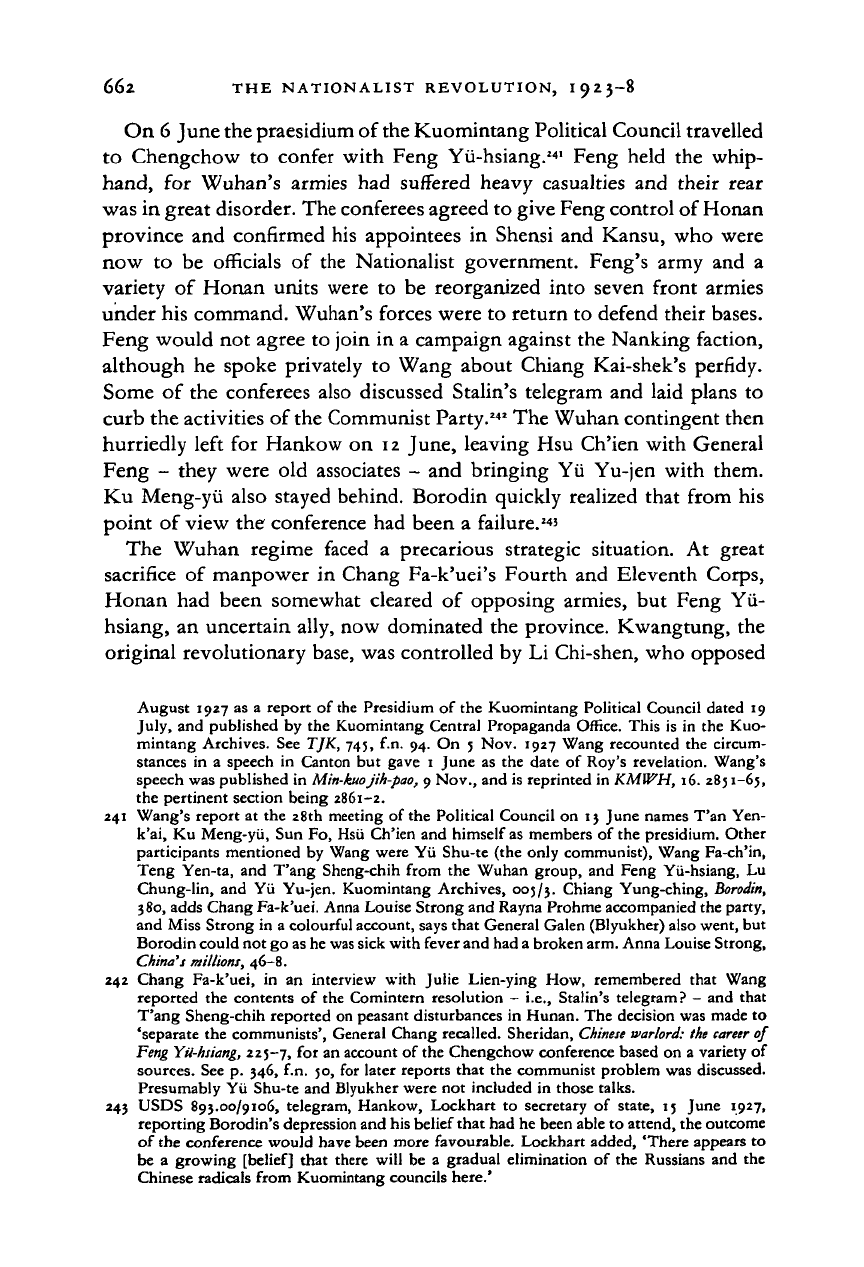
662 THE NATIONALIST REVOLUTION, 1923-8
On
6
June the praesidium
of
the Kuomintang Political Council travelled
to Chengchow
to
confer with Feng Yii-hsiang.
241
Feng held
the
whip-
hand,
for
Wuhan's armies
had
suffered heavy casualties
and
their rear
was
in
great disorder. The conferees agreed
to
give Feng control
of
Honan
province
and
confirmed
his
appointees
in
Shensi
and
Kansu,
who
were
now
to be
officials
of
the
Nationalist government. Feng's army
and
a
variety
of
Honan units were
to be
reorganized into seven front armies
under
his
command. Wuhan's forces were
to
return
to
defend their bases.
Feng would
not
agree
to
join
in a
campaign against
the
Nanking faction,
although
he
spoke privately
to
Wang about Chiang Kai-shek's perfidy.
Some
of
the
conferees also discussed Stalin's telegram
and
laid plans
to
curb
the
activities
of
the Communist Party.
242
The
Wuhan contingent then
hurriedly left
for
Hankow
on 12
June, leaving
Hsu
Ch'ien with General
Feng
-
they were
old
associates
—
and
bringing
Yii
Yu-jen with them.
Ku Meng-yii also stayed behind. Borodin quickly realized that from
his
point
of
view
the
conference
had
been
a
failure.
243
The Wuhan regime faced
a
precarious strategic situation.
At
great
sacrifice
of
manpower
in
Chang Fa-k'uei's Fourth
and
Eleventh Corps,
Honan
had
been somewhat cleared
of
opposing armies,
but
Feng
Yii-
hsiang,
an
uncertain ally,
now
dominated
the
province. Kwangtung,
the
original revolutionary base,
was
controlled
by Li
Chi-shen,
who
opposed
August 1927
as a
report
of
the Presidium
of
the Kuomintang Political Council dated
19
July, and published
by
the Kuomintang Central Propaganda Office. This
is in the
Kuo-
mintang Archives. See TJK, 745,
f.n.
94.
On 5
Nov. 1927 Wang recounted
the
circum-
stances
in a
speech
in
Canton
but
gave
1
June
as the
date
of
Roy's revelation. Wang's
speech was published
in
Min-kuojih-pao,
9 Nov., and is reprinted in
KMWH,
16. 2851-65,
the pertinent section being 2861-2.
241 Wang's report
at
the 28th meeting
of
the Political Council
on
13 June names T'an Yen-
k'ai,
Ku
Meng-yii, Sun Fo, Hsu Ch'ien and himself as members
of
the presidium. Other
participants mentioned
by
Wang were Yii Shu-te (the only communist), Wang Fa-ch'in,
Teng Yen-ta,
and
T'ang Sheng-chih from
the
Wuhan group,
and
Feng Yii-hsiang,
Lu
Chung-lin,
and Yii
Yu-jen. Kuomintang Archives, 005/3. Chiang Yung-ching,
Borodin,
380,
adds Chang Fa-k'uei. Anna Louise Strong and Rayna Prohme accompanied the party,
and Miss Strong
in
a colourful account, says that General Galen (Blyukher) also went, but
Borodin could not go as he was sick with fever and had a broken arm. Anna Louise Strong,
China's
millions,
46—8.
242 Chang Fa-k'uei,
in an
interview with Julie Lien-ying How, remembered that Wang
reported
the
contents
of
the Comintern resolution
-
i.e., Stalin's telegram?
- and
that
T'ang Sheng-chih reported on peasant disturbances
in
Hunan. The decision was made
to
'separate the communists', General Chang recalled. Sheridan,
Chinese
warlord:
the
career
of
Feng
Yii-hsiang,
225-7,
for
an
account
of
the Chengchow conference based
on a
variety of
sources. See
p.
346, f.n. 50,
for
later reports that the communist problem was discussed.
Presumably Yii Shu-te and Blyukher were not included
in
those talks.
243 USDS 893.00/9106, telegram, Hankow, Lockhart
to
secretary
of
state,
15
June
1927,
reporting Borodin's depression and his belief that had he been able to attend, the outcome
of the conference would have been more favourable. Lockhart added, 'There appears
to
be
a
growing [belief] that there will
be a
gradual elimination
of
the Russians
and the
Chinese radicals from Kuomintang councils here.'
Cambridge Histories Online © Cambridge University Press, 2008
